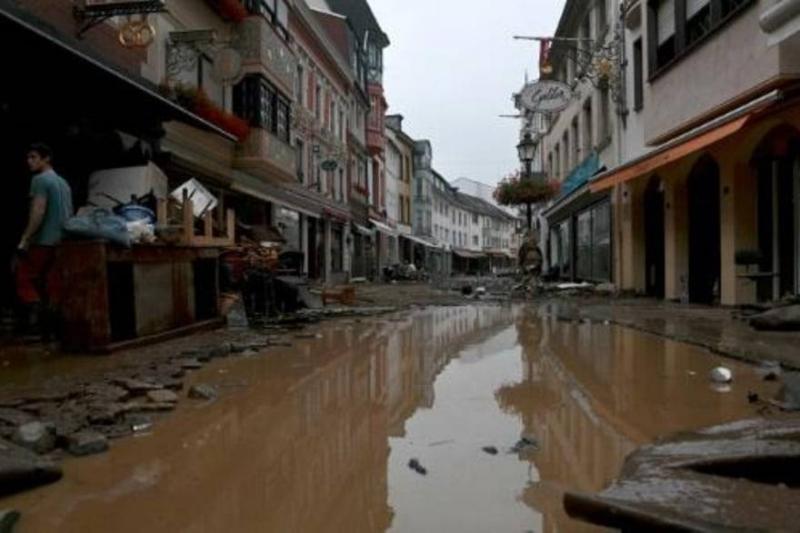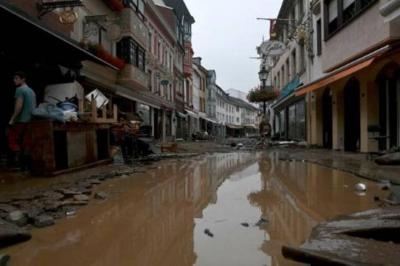Emergency teams in Germany continue to search on Friday for hundreds of missing persons after the worst flooding that has resulted in at least 81 deaths in the western part of the country. German Chancellor Angela Merkel expressed her fears from Washington, where she met President Joe Biden, stating that "we may only be able to understand the true scale of the disaster in the coming days."
The popular daily newspaper "Bild" headlined its front page "Death Floods" following heavy rains in several areas that caused material damage and instilled fear among residents who were surprised by the flooding. The neighboring country of Belgium reported at least nine deaths, while Luxembourg and the Netherlands were severely affected by the torrents, with thousands evacuated from Maastricht. However, the death toll in Germany was the highest at 81 and is likely to rise as a large number of people remain missing in the states of North Rhine-Westphalia and Rhineland-Palatinate, the most affected areas.
In the devastated region of Ahrweiler in Rhineland-Palatinate, around 1,300 people are unaccounted for, although local authorities informed "Bild" that this high number is likely due to damaged phone networks, making it difficult to communicate with many. Regional Interior Minister Roger Lewentz told the "WDR" radio, "We believe there are still 40 or 50 or 60 people missing, and when you don't hear anything about people for a long time... you have to fear the worst." He added that "the number of victims will likely continue to rise in the coming days."
Furthermore, continuous rains are expected in parts of western Germany, with water levels in the Rhine River and its tributaries rising dangerously. Around 1,000 soldiers have been deployed to assist in rescue and debris removal operations in the affected towns and villages. Streets and homes are submerged in water, overturned cars, and uprooted trees can be seen across all locations hit by the floods, isolating some areas from the outside world. In Ahrweiler, many homes completely collapsed, creating the impression that a tsunami had struck the town. At least 20 people have been confirmed dead in Ahrensburg, one of the most affected towns in the north. The usually clean and tidy city center looks like a wasteland.
Merkel told reporters in Washington, "My heart goes out to all those who have lost loved ones in this disaster and to those who are concerned about the fate of people still missing." She clarified that her government would not leave those affected "alone in their suffering," adding that they are "doing everything possible to assist them in their ordeal." Anne Marie Müller (65), looking at her waterlogged garden from her balcony, stated that her town of Mayen was not prepared for this disaster, asking, "Where did all this rain come from? It's madness."
In Belgium, four people are still reported missing, and the military has been sent to four of the ten provinces in the country to aid in rescue and evacuation efforts. With homes submerged since Wednesday, people have been temporarily relocated from a spa resort to tents. The President of Wallonia, Elio Di Rupo, indicated that the swollen Meuse River "will pose a threat to Liège," a neighboring city home to 200,000 residents.
Climate Change?
Storms have brought the issue of climate change back to the forefront of the election campaign in Germany ahead of the elections scheduled for September 26, which will end Merkel's 16-year tenure in power. German Interior Minister Horst Seehofer stated that Germany "must be better prepared" for the future, adding that "this extreme weather is a result of climate change."
As the warming atmosphere traps more moisture, climate change increases both the frequency and intensity of flood events caused by heavy rainfall. In urban areas with poor drainage systems and buildings located in flood-prone areas, damage can be extensive. Candidates have rushed to raise the issue of climate and make climate pledges following the floods. North Rhine-Westphalia's Prime Minister Armin Laschet, the conservative candidate to succeed Merkel, called for "accelerating" global efforts to combat climate change, emphasizing the link between climate change and extreme weather events.




